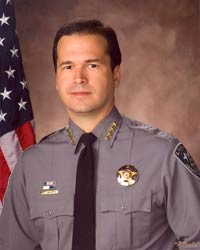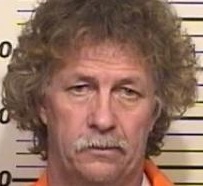| No, they're not ETs; they're JBTs: El Paso County SWAT operators play-act a big drug bust. |
Sheriff Terry Maketa
of Colorado’s El Paso County has promised his constituents that he “will
actively oppose any effort that infringes upon your second amendment rights.”
“Like every elected
official in the state, I took an oath to support the Constitution of the United
States and the Constitution of the State of Colorado,” wrote Maketa in an open letter to El Paso
County residents. “This means all rights.”
That promise
apparently doesn’t apply to the right of an unarmed citizen to defend himself
against acts of criminal violence committed by one of Maketa’s deputies. If it
did, Maketa – who, like every other sheriff, has some discretion regarding
prosecutions – would have urged the local prosecutor to drop all charges against
Calhan,
Colorado resident David Goss, a sod farmer who is now serving an unjustified
four-year prison sentence for the supposed crime of trying to avoid being shot in
the stomach by Deputy Jeff Schulz.
On
the evening of June 16, 2011, Deputy Schulz responded to a call from a woman
who had been chased away by Goss after she and several friends accidentally
trespassed on his farm. In the weeks leading up to that incident, Goss -- who would later be described by a trial judge as "a pillar of his community" -- had
suffered a series of robberies and received no help from the Sheriff’s Office.
He was sitting in his pickup at the end of a long driveway when Schulz arrived.
Owing to his understandable frustration, Goss had been abrupt and inhospitable
in dealing with the unwanted visitors, and his mood didn’t improve when Schulz
showed up.
According
to Shulz’s original account of the confrontation, Goss
approached his vehicle in a “menacing” fashion, which
prompted the officer to whirl around and shoot him with a Taser. Goss was not a
criminal suspect. After being attacked without cause on his own property, Goss removed
the Taser barbs and then knocked the weapon out of the assailant’s hands. This
act of self-defense was later described as the supposed crime of “disarming an
officer.”
A
struggle then ensued in which the deputy – despite being larger and younger
than the farmer – supposedly wound up pinned to the ground on his back as Goss
repeatedly beat him with his own radio and threatened to kill him. At that point,
Schulz – supposedly fearing for his life -- shot the unarmed and already
traumatized farmer in self-defense.
That
was not to be the only version of the story told by Schulz. Furthermore,
eyewitnesses to the struggle told a very different story: In their account, Schulz
had drawn his gun and was struggling with Goss while firing wildly. One of the
rounds struck the car being driven by Goss’s wife, who, out of concern for her
husband, had come down the driveway.
After
shooting Goss in the stomach, Schulz attempted to shoot him again, but the gun
misfired. Schulz – visibly agitated and muttering to himself — spent several
minutes driving in circles in his police vehicle, without calling for an
ambulance. Shulz also threatened several eyewitnesses on the scene.
Confronted
about his inconsistencies on the witness stand, Schulz — a paragon of self-pity
who was reduced to blubbering at several points during Goss’s trial — insisted
that “the situation was chaotic …. So if I don’t remember something that’s
normal and typical.” Since cops are trained and
given official permission to lie, self-serving perjury of this kind is,
as Deputy Schulz said, entirely normal and typical.
Defense attorney Geoffrey
Heim
produced photographs of Deputy Schulz after the incident showing that there was
dust on the left leg of his trousers, but none on his back. Prosecutor Tanya
Karimi dismissed that critical evidence of perjury by maintaining that Schulz
was merely “mistaken” about how he had landed on the ground, and that he was on
his side when the struggle took place. That version, fatally undermined the
melodramatic depiction of Goss was kneeling on Schulz’s chest and beating him
severely.
The DA said that this was consistent with Schulz’s claim that Goss had tried to grab his gun. This key detail is consistent with eyewitness claims that Goss was struggling with the Schulz after the deputy had drawn his gun and was firing wildly. It also confirms that the deputy had attempted to shoot Goss a second time after already shooting him in the stomach at close range. All of this indicates that rather than trying to take Schulz’s gun and use it against him, Goss was trying to prevent the deputy from murdering him.
Despite
Schulz’s abundant self-contradictions, the testimony of eyewitnesses, and
substantial material evidence impeaching the deputy’s claims, Goss was found
guilty of second-degree assault on an officer, disarming an officer, and
several other charges.
At the sentencing hearing, a tearful Schulz
continued to indulge his unappeasable sense of victimhood.
“You
caused me more pain than you can imagine,” whimpered Schulz, addressing Goss.
“I have no pity for you even though I know that I should.” So vast, deep, and
poignant was Schulz’s pity for himself that he could spare no sympathy for the
man he had assaulted and attempted to murder.
Schulz’s
petulance was matched by the arrogant sanctimony of Presiding Judge William
Bain, who said that the “message” imparted by caging an innocent farmer for the
“crime” of being assaulted by a uniformed tax-feeder was that “if you get in a
fight with a cop you’re going to go to prison.”
Actually,
the “message” delivered by Bain and Schulz – and tacitly endorsed by Sheriff
Maketa – was that when a police officer decides to murder someone, the
individual targeted for that act of official violence has a duty to die. Should
the victim survive the assault, he will be sent to prison.
According
to Goss’s family, the farmer has filed an appeal -- but this will avail them nothing, even if it succeeds.
“This
really seems kind of pointless, because by the time the appeal is through,
David will probably have finished his sentence,” one source close to the family
told Pro Libertate in an interview last summer.
His
family declines to discuss the case on record out of fear that public criticism
of the Colorado “justice” system may result in a retaliatory prison assignment
that could endanger the health and safety of the 54-year-old farmer.
Because
the purported “victim” in this matter was a police officer, Goss was taken
directly from the courthouse to a cell. Not content to see his victim
incarcerated, Schulz is also seeking to ruin his family financially: The deputy,
who claims that he will “never recover” from the physical and psychological
trauma of his encounter with Goss, has
filed a lawsuit against his victim.
Despite
his supposedly incapacitating injuries, Schulz — a shameless perjurer whose
behavior suggests a capacity for pathological violence — remains on duty. In
fact, Sheriff Maketa considers Schulz a hero and exemplar: Schulz was awarded a
Medal of Valor for his attempt to murder David Goss (see page 38 of the
department’s 2011
Annual Report).
For
all of his posturing as a Second Amendment stalwart, Sheriff Maketa obviously doesn’t
believe that citizens have a right to armed self-defense against
government-sanctioned lethal violence. If he is willing to countenance the
imprisonment of an innocent citizen whose only “crime” was to disarm a deputy
who attempted to kill him, Maketa obviously isn’t going to defend the rights of
a citizen who actually uses a firearm to protect himself against criminal
aggression by a law enforcement officer.
Like
most sheriffs across the country, Maketa is eager to deploy SWAT teams on the
flimsiest of pretexts. A few weeks ago he
dispatched three SWAT operators to arrest Catherene Wilson, a five-foot-three,
silver-haired, 56-year-old grandmother, who was held for five days in the
El Paso County Jail because of an erroneous extradition order filed by a law
enforcement agency in Orlando, Florida. The order was generated by a
35-year-old credit card conviction, for which she completed a term of five years' probation decades ago.
Wilson’s
husband Jim repeatedly attempted to contact Sheriff Maketa, only to be
studiously ignored. With the expensive help of attorneys from Florida and
Colorado, Wilson was released and the charges against her were dismissed –
twelve days after she was able to document that the warrant was invalid.
If the
family hadn’t possessed the material resources to hire legal help, Mrs. Wilson –
whose nickname is “Abuelita” (“Little Grandmother”) -- would probably still be
in jail.
If,
on the other hand, she had tried to defend herself from the armed strangers who
abducted her without just cause, Abuelita would either be dead, or headed to
prison. And the sheriff who dispatched the kidnappers would probably give them
a commendation.
In his recent message to constituents, Sheriff Maketa said
that the government should focus its attention on “those who are most likely to
commit acts of violence and not target the law abiding patriots of our nation.”
The real danger to the public, he pointed out, is not private gun owners but
rather “individuals who demonstrate violent or homicidal ideations.”
Maketa had an opportunity to take an individual meeting that
description off the street. Instead, he kept him in uniform and gave him a
medal.
Thank you so much...
... to everybody who has given so generously to help keep Pro Libertate up and running. It really means a lot to me and my family. It is no exaggeration to say that I couldn't continue doing this work without your help. We appreciate your kindness more than I can adequately express. Thanks once again!
Dum spiro, pugno!




13 comments:
Another disgusting parasite trying to murder people for the cause of "officer safety".
Upon reading Mr. Grigg's article, my fourteen year old daughter Bethany laughingly exclaimed, "Hey, dad! I do believe I could kick it's ass!"
"I know you can, hon!", I replied.
Deputy Jeff Schulz is one amazing pussy.
Ridiculous, I don't see how being a police officer offers any credentials for citizens to blindly trust.
the state in all its glory:
-citizen intimidation, harassment and physical abuse;
-perjury as 'testimony';
-prosecutor that accepts perjury as testimony;
-judge that is anything BUT impartial.
this will last as long as we, the people, accept it.
Your Right of Defense Against Unlawful Arrest
http://constitution.org/uslaw/defunlaw.htm
“Citizens may resist unlawful arrest to the point of taking an arresting officer's life if necessary.” Plummer v. State, 136 Ind. 306. This premise was upheld by the Supreme Court of the United States in the case: John Bad Elk v. U.S., 177 U.S. 529. The Court stated: “Where the officer is killed in the course of the disorder which naturally accompanies an attempted arrest that is resisted, the law looks with very different eyes upon the transaction, when the officer had the right to make the arrest, from what it does if the officer had no right. What may be murder in the first case might be nothing more than manslaughter in the other, or the facts might show that no offense had been committed.”
“An arrest made with a defective warrant, or one issued without affidavit, or one that fails to allege a crime is within jurisdiction, and one who is being arrested, may resist arrest and break away. lf the arresting officer is killed by one who is so resisting, the killing will be no more than an involuntary manslaughter.” Housh v. People, 75 111. 491; reaffirmed and quoted in State v. Leach, 7 Conn. 452; State v. Gleason, 32 Kan. 245; Ballard v. State, 43 Ohio 349; State v Rousseau, 241 P. 2d 447; State v. Spaulding, 34 Minn. 3621.
“When a person, being without fault, is in a place where he has a right to be, is violently assaulted, he may, without retreating, repel by force, and if, in the reasonable exercise of his right of self defense, his assailant is killed, he is justified.” Runyan v. State, 57 Ind. 80; Miller v. State, 74 Ind. 1.
“These principles apply as well to an officer attempting to make an arrest, who abuses his authority and transcends the bounds thereof by the use of unnecessary force and violence, as they do to a private individual who unlawfully uses such force and violence.” Jones v. State, 26 Tex. App. I; Beaverts v. State, 4 Tex. App. 1 75; Skidmore v. State, 43 Tex. 93, 903.
“An illegal arrest is an assault and battery. The person so attempted to be restrained of his liberty has the same right to use force in defending himself as he would in repelling any other assault and battery.” (State v. Robinson, 145 ME. 77, 72 ATL. 260).
“Each person has the right to resist an unlawful arrest. In such a case, the person attempting the arrest stands in the position of a wrongdoer and may be resisted by the use of force, as in self- defense.” (State v. Mobley, 240 N.C. 476, 83 S.E. 2d 100).
“One may come to the aid of another being unlawfully arrested, just as he may where one is being assaulted, molested, raped or kidnapped. Thus it is not an offense to liberate one from the unlawful custody of an officer, even though he may have submitted to such custody, without resistance.” (Adams v. State, 121 Ga. 16, 48 S.E. 910).
“Story affirmed the right of self-defense by persons held illegally. In his own writings, he had admitted that ‘a situation could arise in which the checks-and-balances principle ceased to work and the various branches of government concurred in a gross usurpation.’ There would be no usual remedy by changing the law or passing an amendment to the Constitution, should the oppressed party be a minority. Story concluded, ‘If there be any remedy at all ... it is a remedy never provided for by human institutions.’ That was the ‘ultimate right of all human beings in extreme cases to resist oppression, and to apply force against ruinous injustice.’” (From Mutiny on the Amistad by Howard Jones, Oxford University Press, 1987, an account of the reading of the decision in the case by Justice Joseph Story of the Supreme Court.
As for grounds for arrest: “The carrying of arms in a quiet, peaceable, and orderly manner, concealed on or about the person, is not a breach of the peace. Nor does such an act of itself, lead to a breach of the peace.” (Wharton’s Criminal and Civil Procedure, 12th Ed., Vol.2: Judy v. Lashley, 5 W. Va. 628, 41 S.E. 197)
William, can you set up a bitcoin donation address? I'd like to send you a donation. You can get one by setting up an account at http://blockchain.info
Now do you really believe any of these costumed armed thugs are going to respect our "2nd Amendment Rights"? They are our enemy. Respond accordingly.
Will,
I read your articles on lewrockwell.com. No other writing on that site stirs me up like yours. My heart rate actually goes up.
Tried calling the High Sheriff to ask if he's ever read the supreme court decision John Bad Elk vs the United States, but was unable to speak with him. Seems they're getting quite a few calls /emails lately. Hmmmm, wonder why?
It's all a misunderstanding. What Sheriff Maketa meant concerning our 2nd Amendment right was that we do have that right to protect ourself, just not against them. As for all you people in that county, (empire)
The power of the judge or prosecutor over the jury is in direct proportion to the jury’s ignorance.
Red Beckman
"In deciding that Schulz was justified in the use of force, the district attorney cited evidence of a stove piped bullet casing. That malfunction is caused, they say, by a fired case not clearing the pistol and getting caught in the slide. It is consistent with hands on the gun."
Actually a stovepipe can occur even if there are no "hands on the gun" (slide).
You and people like you are truly what is missing in the presstitute mafia-media. Thank you for being a true journalist.
So a jury of this pillar of the community didn't believe this innocent man and voted with the evil cop?
Something tells me that the presentation is about as valid as Obama details of his birth.
Post a Comment